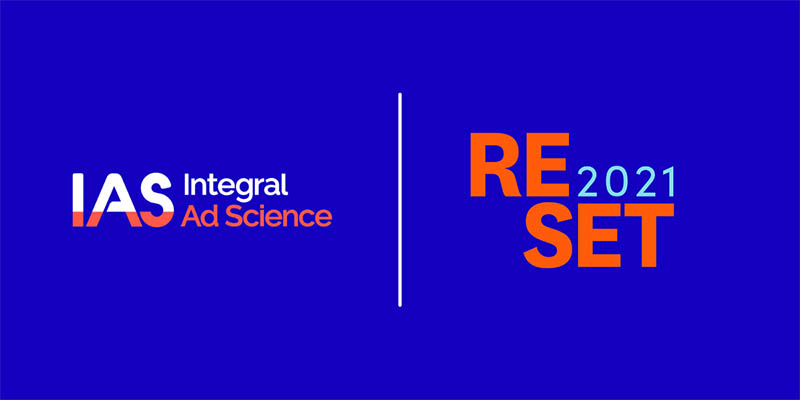
On 29th January 2021, IAS was proud to support RESET, an industry first event in joint collaboration between the Advertising Association, ISBA, and the IPA.
With a notable line-up of speakers from across the industry covering a wide range of topics, the event helped shape the agenda for UK digital advertising in 2021.
RESET brought together brands, agencies, publishers and technology providers to discuss how the industry will support the UK’s recovery following the repercussions of the pandemic, and how the industry can achieve its goal to instil greater transparency and trust within digital advertising.
Although hosted online, the event provided a platform for 600+ attendees to network, visit stands and take part in the most important panel discussions concerning advertising this year. IAS took part with its virtual booth, sharing best practices and data insights with exhibitors and visitors.
Here’s a wrap-up of the event and the key themes that were discussed.
The Recovery
2020 has been a crucial year for UK digital advertising. As with all industries, digital advertising has been challenged following the fallout of the global pandemic. At the same time, the industry has adapted and innovated like never before.
Oliver Dowden CBE, Secretary of State for DCMS, hailed the role of advertising in rebuilding the economy in his keynote address at RESET. “I also want to reassure the industry that there is a glimmer of real opportunity ahead,” Dowden said in his statement. “And advertising will be absolutely pivotal in rebuilding our economy and bringing it back to full strength. A strong market economy needs advertisers…”
For example, participants at the event highlighted how flexible working enforced across the country has been a success and businesses have continued to evolve and thrive. Technology, group activities and communication have helped the workforce feel as comfortable as possible in new working environments.
Lessons Learned
There are many lessons to be learned as the UK overcomes and moves forward from the pandemic. RESET highlighted proposed initiatives that can be adopted by the industry as a collective.
Amidst a pandemic, the other monumental event and global force for change that was actualised in 2020 was in the form of social movements around diversity and inclusion. Event participants agreed that it’s been very encouraging that even during a global pandemic, diversity has been prioritised; but there’s still more industry-wide efforts to be made and digital advertising can play a crucial part.
Keith Weed, President of the Advertising Association, used the RESET event to announce ‘the All In’ campaign to build back a better and inclusive industry for all. Led by the Advertising Association, and in partnership with ISBA and the IPA, the campaign will invite UK advertising and marketing professionals to take part in an industry-wide census.
It will benchmark future progress and provide a make-up of UK advertising’s workforce. This will then be used to inform an Action Plan later on in the year on how to achieve greater inclusivity across the industry. For more information, visit here.
The event concluded that diversity efforts must not only play a part on how businesses hire and build teams, they must also underpin the diverse technology solutions that can be developed and implemented.
Public Trust
The constant pace of digital advertising development and evolving consumer demands continue to make the digital landscape more complex. There has been a great drive to improve trust; both amongst partners within the industry and in the public domain. “I want to see advertising that is fair, ethical and accountable,” Dowden announced at RESET.
IAS’s recent Industry Pulse Report, surveying global digital advertising professionals, found that programmatic transparency remains a top challenge for one-quarter (24%) of the industry in 2021. Further still, more than half (59%) of respondents will likely adjust social media ad spend due to insufficient transparency into media quality metrics.
Further still, the RESET event highlighted the role advertising has to play following a rise in hate speech and misinformation. IAS data from its Ripple Effect 2.0 Study showed that half (51%) of consumers hold brands as most responsible for the placement of ads. Furthermore, the majority (67%) of consumers consider content from trusted sources important in determining content quality.
Now more than ever, the advertising industry needs trusted metrics that allow a common framework upon which all parts of the ecosystem can transact. That’s why third party verification and metrics that evolve beyond binary measurement of clicks and conversion rates can be effective.
As we look ahead, IAS welcomes an industry-wide effort to overcome the challenges faced in digital advertising over the past year and working together to provide solutions for partners.
As one of the largest partners to leading agencies, advertisers, brands, publishers and platforms, check out our best practices and data insight to help you reset your marketing strategy for 2021:
How to balancing digital advertising risk and reach during a global pandemic
Research: How context and sentiment inform consumer perceptions
 Share on LinkedIn
Share on LinkedIn Share on X
Share on X


